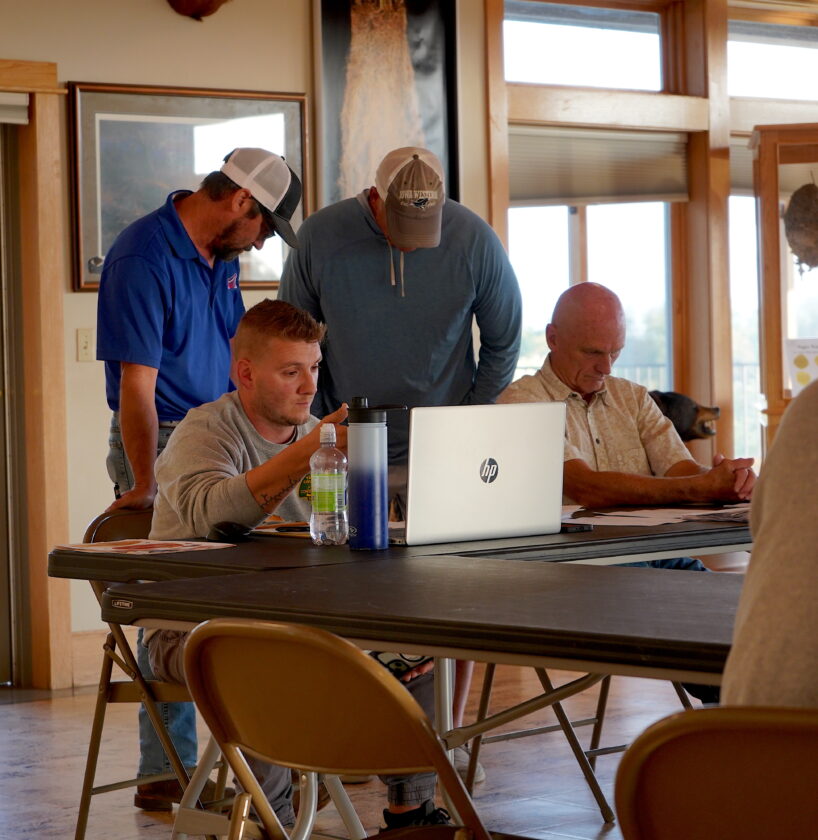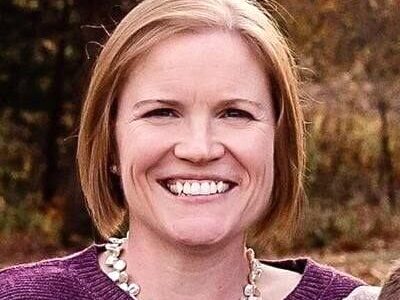AI software divides Tama County Board of Conservation

Members of the Tama County Board of Conservation including (clockwise from back left) Chairman Bryan Wacha, Chris Behrens, and Steve Kenkel (seated right) listen on Wednesday, Sept. 3, as Director Curtis Behrens (seated left) plays an audio recording of the previous month’s meeting. The group was trying to discern where a period belonged in a motion made by Danielle Dunning for the purchase of artificial intelligence (AI) software. PHOTO BY RUBY F. MCALLISTER
OTTER CREEK LAKE & PARK – The regular September meeting of the Tama County Board of Conservation was both long and, at times, contentious as the body led by Director Curtis Behrens worked through a number of agenda items including planning for the upcoming Fall Fest, an offer of employment for the ranger, a spending limit on director purchases, and the possibility of using artificial intelligence (AI) to organize board meetings.
The Sept. 3 meeting began with approval of the consent agenda which included the minutes from the Aug. 13 meeting. Prior to any approval, a lengthy discussion was initiated by board member Danielle Dunning debating the accuracy of the minutes – minutes taken by the director. Specifically, she took issue with the wording of a motion to purchase OnBoard AI software for $3,000. Dunning said she did not want to approve the minutes as written. For his part, Dir. Behrens said he “pulled that sentence right from the recording.”
Ultimately, approval of the minutes was tabled to next month.
The newspaper reached out to Dir. Behrens by email following the meeting for clarification.
“There was a discrepancy on how a motion was made regarding the purchase of the new OnBoard software in August and its interpretation on the draft minutes [versus] the August meeting audio recording,” Dir. Behrens said. “The minutes were not approved.”
The software purchase, spearheaded by Dunning, was first brought to the board’s attention during the August meeting. As part of his follow-up email, Dir. Behrens attempted to explain the software.
“Per my understanding of the software, and as I tried to convey to the board that evening, the benefits the software advertises for agenda building, compiling meeting material, acquiring signatures, tallying votes, etc. does not present enough time or paper-saving advantages for the administrative side of meeting preparation, and comes with a steep price in our already scaled back budget.”
Both during the meeting and in his email, Dir. Behrens gave several reasons why he was against the purchase including:
-Software doesn’t integrate with the County’s website where the board is required to post agendas and minutes.
-Building and adding to the agenda is currently easily/simply done through email.
-The auditor’s office requires wet signatures from board members and won’t accept digital signatures.
-Meeting materials, specifically expense claims, would need to be digitally uploaded individually and compiled into the program and then reprinted for wet signatures and submission to the auditor’s office.
He also said if the purchase includes transcription, such transcripts “would still need to be reviewed against the audio to verify accuracy of the transcript as [artificial intelligence] still struggles to differentiate who is talking, especially when multiple people are talking, unless everyone is digitally, and separately, signed into the software with their own phone/computer and quality microphone.”
Much later in the three-and-a-half hour meeting as part of an action item regarding the software purchase, Dir. Behrens and Dunning went back and forth, again, on the purchase.
“None of this seems like it’s time-saving to me,” Dir. Behrens said of the software.
“What we need documented is the motions and the votes. Maybe your opinion varies on that, but that’s [what] the $3,000 spending amount [was for]. It isn’t necessarily for the AI … There’s more behind the intention of the purchase than that,” Dunning said in response to a comment made by the director about the 14-day free trial currently being used to provide digital transcription (only). Later, Dunning stated, “So I understand that you have a lot of reasons why you don’t want to do it, but I’d like to still try it for a year.”
“I’m telling you that this will not lessen the burden of my job. And that’s why I’m against it. It allows you guys to touch things a little differently and that’s about it,” Dir. Behrens said.
During the meeting, Dir. Behrens also indicated he had spoken with several “experts” as well as Tama County Auditor Karen Rohrs and a county supervisor about the purchase. For her part, Dunning said she was made aware of the program by the Tama County attorney.
“The Auditor said we can’t have this program?” Dunning asked.
“They didn’t think fiscally [we should have this program],” Dir. Behrens replied. “It was just their opinion that this software didn’t sound like it was going to help much. …Sounds like some of the Board of Supervisors were pushing against using AI. … [Supervisor] David Turner seemed to think it wasn’t necessary.”
“There seems to be some grey on the motion that was passed at last month’s meeting,” Chair Bryan Wacha said when the back and forth died down.
“I think the grey is any motion that I try to make – that Curtis doesn’t like – doesn’t get approved,” Dunning replied.
More back and forth ensued over the 14-day trial and last month’s motion which seemingly had been made to purchase the basic package and begin using it on Sept. 1.
“We just need to reaffirm the vote,” board member Chris Behrens piped up. “I agree with what you’re saying. In my opinion, we need to reaffirm.”
Dunning then motioned to approve the OnBoard AI purchase for the premium package for $3,000 for one year. Jim Allen seconded the motion. Allen, Chris Behrens, and Dunning voted in favor, while vice chair Steve Kenkel and, it seems, Wacha voted against.
“The Board voted 3-2 to purchase [one] year of this software for $3,000,” Dir. Behrens said in his email. “If we collectively decide to add-on AI minutes transcription anytime during that [one-year] subscription, it will be an additional $2,000 for a total of $5,000 per year.”
When asked if he was aware of any other Tama County boards or county conservation boards in Iowa using the software, he said he was not aware of any, adding, “It apparently came recommended by the [Tama] County attorney.”
The newspaper also asked him to address the discontinuation of the previous practice of the naturalist taking the meeting minutes – a practice that ended following the termination last December of naturalist Raina Genaw.
“The naturalist doesn’t currently take minutes quite simply because I took it over [in the] absence of a naturalist and just kept doing it after a new one was hired,” Dir. Behrens said. “Since I do not require my staff to attend every meeting, I’ve chosen to continue to manage this myself for now. I have been audio recording meetings since February to capture everything and extract details later for drafting the meeting minutes, while only noting motions/votes during the meeting itself.”
Ranger
Also during the meeting, the board approved a series of motions regarding the ranger position which was left empty following former park officer Riley Conrad’s resignation this past March to take a position with the Belle Plaine Police Department. Conrad was first appointed to the position on June 1, 2022, by then-director Stephen Mayne. He graduated from Iowa Law Enforcement Academy (ILEA) in the spring of 2023.
Motions approved included requiring ILEA certification as a condition of employment to be completed by Dec. 31, 2026; reimbursement would have to made to Tama County for the cost of ILEA training if the ranger subsequently leaves employment within three years; ranger may not use a County vehicle to travel to and from work until ILEA is successfully completed.
In his follow-up email to the newspaper (sent on Sept. 5), Dir. Behrens said a verbal offer had been made and accepted by the prospective applicant for the ranger position but “per Board-requested amendments to the job offer letter, an official offer has not yet been signed.”
“This will be for a park ranger/conservation tech, nearly identical to the role Riley Conrad had when he was here working as a conservation tech during much of the year, while patrolling campground and wildlife areas as needed in flux throughout the camping and hunting seasons.”
The prospective candidate has both conservation and patrol experience, he added.
Other business
Extensive planning of the 2025 Fall Fest took place and will be addressed in an article scheduled to publish in next week’s edition of the newspaper.
A motion to open a savings account at Lincoln Savings Bank for Izaak Walton Shooting Facility deposits passed unanimously. Previously, such funds were placed in the general fund. Currently the Ike’s Fund totals almost $9,000, Dir. Behrens said.
A motion to set a spending limit on director purchases made without board approval failed to pass.
“Not once have we blown the bank and wasted any money, or been out of budget,” Dir. Behrens said as the board looked over documents he provided of his purchases over the last two years.
As part of the lengthy discussion, Dunning proposed a spending limit of $750 with any amount above that requiring three signatures.
“I think communication is the main point of the ask,” Dunning explained.
The discussion was heated but controlled with the director and Dunning going back and forth on the issue. Wacha also contributed to the discussion while ticking through the list of purchases, highlighting the many fuel purchases for conservation vehicles and equipment.
“It seems like [a spending limit] slows down the process. … I can’t remember a time someone said, ‘What are we spending $700 on?’ and we didn’t get an answer,” Wacha said. He also pointed out that the board approves the bills each month.
“We got to control him a little bit,” Allen remarked.
In the midst of discussion, Dunning asked for a second on her $750 motion; later, Allen made a “friendly amendment” to the motion, pushing the limit to $1,000.
The motion failed 3-2 with Allen and Dunning voting in favor, Chris Behrens and Kenkel voting against, and Wacha breaking the tie by voting against.
“It’s his job,” Kenkel said, following the vote, while pointing to Dir. Behrens who was seated next to him. “To set the budget. It’s his job.”





